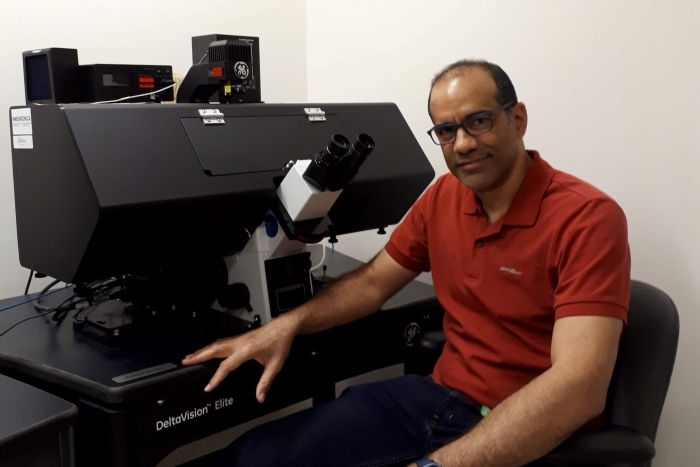Finding ways to prevent detrimental effects caused by Zika virus infection
Stepheny Zani - 31 August 2020

Daniel Limonta, post-doctoral fellow in the Department of Cell Biology, is applying his internationally recognized expertise on virology to advance Zika virus research at the University of Alberta’s Li Ka Shing Institute of Virology
Originally from Cuba, Daniel Limonta, post-doctoral fellow in the Department of Cell Biology, is applying his internationally recognized expertise on virology to advance Zika virus research at the University of Alberta’s Li Ka Shing Institute of Virology. Zika virus affects many countries, with high rates of infection in Brazil and across South and Central America, and is especially detrimental for the fetus during pregnancy, leading to birth defects and high infant mortality. Without available vaccines or drugs to battle the virus, Limonta aims to discover new antiviral therapies to prevent detrimental effects caused by the infection.
Limonta’s work on Zika virus was recently featured on the cover of The Journal of Infectious Diseases. Last November, he received the Faculty of Medicine & Dentistry Med Star Award for Postdoctoral or Clinical Fellows. Learn more about his project below.
Why is Zika virus research important?
After Zika virus re-emerged in Brazil in 2015-2016, it became endemic in many Latin-American countries. Although most people develop a mild flu-like disease, the infection during pregnancy can cause fetal microcephaly and malformations. Zika virus is transmitted by the bite of infected Aedes mosquitoes and by sex, and currently no licensed vaccine or specific drugs are available against Zika virus. This leaves millions of people at risk.
How has your work contributed to Zika virus research?
It is important to develop treatments and preventive methods for Zika virus, so I invested much of my efforts in identifying novel antiviral strategies for Zika and other related flaviviruses, such as Dengue virus. Specifically, I’ve tested new and repurposed drugs against Zika virus in ex-vivo models of the human developing brain.
What got you interested in the Zika virus research?
I worked with Dengue virus for around 10 years. When the Zika virus outbreak happened in Brazil, many researchers working with Dengue virus, including myself, turned to Zika virus, aiming to develop new diagnostic and therapeutics methods and vaccines. Although Zika virus was not a novel virus, its pathogenesis in humans was not very well understood. There was an urgent need to decipher the mechanisms by which this virus infects fetal tissues such as the brain, causing microcephaly and other congenital malformations.
What is next in your virology research?
Canadian institutions and researchers, including the group that I am part of, got involved early in the scientific response against SARS-CoV-2, the causing agent of the COVID-19 pandemic. Today I am testing potential antivirals against SARS-CoV-2 in collaboration with the University of California, San Francisco (UCSF). Specifically, our collaborators genetically modified the soluble form of the SARS-CoV-2 receptor which binds more strongly to the virus. I am testing the potency of these engineered proteins to neutralize SARS-CoV-2 in cell culture, preventing them from entering our cells. I found a neutralization potency that is comparable to reported antibodies isolated from convalescent COVID-19 patients.
Can you tell me a bit about your background?
I completed a medical degree with honours (magna cum laude) at the University of Medical Sciences in Havana, followed by a master’s degree in cellular and molecular biology from the Oswaldo Cruz Institute (FIOCRUZ) in Rio de Janeiro, Brazil, the biggest scientific research institution in Latin America. I did a medical microbiology residency and PhD program at the Pedro Kouri Institute of Tropical Medicine, the national reference centre for medical microbiology and infectious diseases in Cuba, and a World Health Organization Collaborating Center. After that, I successfully applied for a post-doctoral fellowship from Alberta Innovates-Health Solutions (AIHS) to work under the supervision of Tom C. Hobman, Canada Research Chair in RNA Viruses and Host Interactions, and a professor in the U of A’s Department of Cell Biology. Hobman’s group focuses on RNA virus-cell interactions. RNA viruses include HIV and mosquito-transmitted viruses such as Dengue, Zika and Mayaro viruses.
Throughout my career, my parents, who were outstanding professors of medicine at the University of Medical Sciences in Havana, have been some of my biggest inspirations.
Why the U of A?
I am impressed by the scientific and public health achievements of Canadian research institutions and the University of Alberta is one of the best universities in Canada, and well-ranked worldwide. Also, the Li Ka Shing Institute of Virology is one of the premiere institutions in Canada for human virology research.
What excites you about your research work?
The method for making discoveries. Everything starts with new scientific ideas leading to experimental designs and discussions, which turns into novel findings that are eventually reported in international scientific journals. Because of my medical background, my work always has clinical implications aiming to improve prevention, diagnosis and treatment of viral diseases.
Limonta receives support from the Canadian Institutes of Health Research (CIHR).